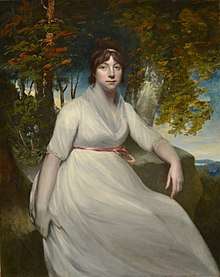Samuel Whitbread (1764–1815)
Samuel Whitbread (18 January 1764 – 6 July 1815) was a British politician.
Samuel Whitbread | |
|---|---|
 Samuel Whitbread II by John Opie | |
| Born | 18 January 1764 Cardington, Bedfordshire, England |
| Died | 6 July 1815 (aged 51) |
| Occupation | Politician |
| Spouse(s) | Lady Elizabeth Grey ( m. 1787) |
| Children | |
Early life
Whitbread was born in Cardington, Bedfordshire, the son of the brewer Samuel Whitbread. He was educated at Eton College, Christ Church, Oxford, and St John's College, Cambridge,[1] after which he embarked on a European "Grand Tour", visiting Denmark, Sweden, Russia, Poland, Prussia, France, and Italy. He returned to England in May 1786 and joined his father's successful brewing business.
Member of Parliament
Whitbread was elected as a Member of Parliament (MP) for Bedford in 1790, a post he held for twenty-three years. Whitbread was a reformer — a champion of religious and civil rights, for the abolition of slavery, a proponent of a national education system and, in 1795, sponsor of an unsuccessful bill for the introduction of minimum wages.[2] He was a close friend and colleague of Charles James Fox. After Fox's death, Whitbread took over the leadership of the Whigs, and in 1805 led the campaign to have Henry Dundas, 1st Viscount Melville, removed from office.
Whitbread admired Napoleon and his reforms in France and Europe. He hoped that many of Napoleon's reforms would be implemented in Britain. Throughout the Peninsular War he played down French defeats convinced that sooner or later Napoleon would triumph, and he did all he could to bring about a withdrawal of Britain from the continent. When Napoleon abdicated in 1814 he was devastated. Whitbread began to suffer from depression, and on the morning of 6 July 1815, he committed suicide by cutting his throat with a razor.
The Hammonds comment that "Whitbread is a politician to whom history has done less than justice... His most notable quality was his vivid and energetic sympathy; he spent his life in hopeless battles and died by his own hand of public despair."[2]
Family

Whitbread married Lady Elizabeth (1765–1846), the eldest daughter of the first Earl Grey on 26 December 1787. Their sons, William Henry Whitbread and Samuel Charles Whitbread, were also Members of Parliament.
Samuel Whitbread Academy in Central Bedfordshire, England, is named after him.[3]
References
- "Whitbread (WHTT782S)". A Cambridge Alumni Database. University of Cambridge.
- Hammond, J. L.; Hammond, Barbara (1912). The Village Labourer 1760-1832. Longhman Green & Co. pp. 139–40.
- "Bedfordshire County Council: The Whitbread Family". www.bedfordshire.gov.uk. Archived from the original on 6 October 2008. Retrieved 21 July 2009.
Further reading
- Fulford, Roger. Samuel Whitbread, 1764-1815: A study in opposition, MacMillan, 1967. (ISBN B0000CNFHB)
External links
- Hansard 1803–2005: contributions in Parliament by Samuel Whitbread
| Parliament of Great Britain | ||
|---|---|---|
| Preceded by Samuel Whitbread William MacDowall Colhoun |
Member of Parliament for Bedford 1790–1800 With: William MacDowall Colhoun |
Succeeded by Parliament of the United Kingdom |
| Parliament of the United Kingdom | ||
| Preceded by Parliament of Great Britain |
Member of Parliament for Bedford 1801–1815 With: William MacDowall Colhoun to 1802, William Lee Antonie 1802–1812, Lord George Russell 1812–1815 |
Succeeded by Lord George Russell Hon. William Waldegrave |